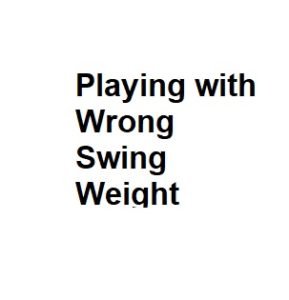In the world of golf, precision and consistency are paramount. One critical factor that often goes overlooked is the swing weight of a golf club. The swing weight is a measurement that determines the balance and feel of a club during your swing. Playing with the wrong swing weight can have a significant impact on your performance on the golf course. In this article, we will delve into what swing weight is, why it matters, and how playing with the wrong swing weight can affect your game.
Understanding Swing Weight
Definition: Swing weight is a measure of a golf club’s balance, indicating how the weight is distributed throughout the clubhead. It’s usually expressed as a letter and a number, with “C” representing a standard swing weight (e.g., C9) and numbers indicating variations.
Importance of Swing Weight
- Balance and Control: The swing weight determines how the club feels in your hands during the swing. A properly balanced club can help you maintain control and consistency in your swing.
- Distance and Accuracy: The right swing weight can affect the clubhead’s speed, impacting both distance and accuracy. A well-matched swing weight can optimize your performance.
Effects of Playing with the Wrong Swing Weight
- Loss of Control: Playing with a swing weight that doesn’t match your swing can result in a loss of control. If the club feels too heavy or too light, it can throw off your timing and rhythm, leading to wayward shots.
- Inconsistency: Inconsistent swing weight can lead to inconsistent results. You may find it difficult to repeat the same swing, causing variations in both distance and accuracy.
- Fatigue: A swing weight that doesn’t suit your swing can lead to fatigue. If the club feels too heavy, you may strain yourself, affecting your performance over the course of a round.
- Overcompensation: Golfers playing with the wrong swing weight may start to overcompensate in their swings, leading to additional swing flaws that can be challenging to correct.
How to Determine the Right Swing Weight
- Get Professionally Fitted: The best way to determine the right swing weight for your game is to get professionally fitted by a club fitter. They will analyze your swing and recommend the appropriate swing weight for your clubs.
- Experimentation: For those unable to get a professional fitting, some experimentation may be required. Try different clubs with varying swing weights to find what feels most comfortable and consistent.
- Consider Your Swing Speed: Generally, players with faster swing speeds may benefit from a slightly heavier swing weight, while those with slower swings may prefer a lighter swing weight.
- Seek Expert Advice: Consult with a golf professional or coach for guidance on swing weight adjustments if you experience issues with your game.
Tips for Adjusting Swing Weight
- Adding Weight: If you find your clubs are too light for your liking, you can experiment with adding lead tape to the clubhead or grip. This allows for customization without the need for new clubs.
- Changing Grips: The grip of a club can also influence its swing weight. A thicker grip can make the club feel slightly heavier, while a thinner grip can make it feel lighter. Experimenting with grip size can help fine-tune the swing weight.
- Counterbalancing: Some golfers choose to counterbalance their clubs by adding weight to the grip end. This can help create a more even balance throughout the swing, especially with longer clubs like drivers and fairway woods.
- Club Length: The length of your club can also affect its swing weight. Longer clubs generally have a lighter swing weight, so be mindful of this when selecting club lengths.
Maintaining Your Swing Weight
- Regular Checks: Periodically check the swing weight of your clubs to ensure they haven’t changed due to wear and tear or modifications. Even small alterations can impact your game.
- Clubhead Replacement: If you need to replace a clubhead, make sure the new one matches the swing weight of the old one or is properly fitted to your swing.
- Weighted Practice Clubs: Consider using weighted training clubs during practice to help you develop a consistent swing. These clubs are designed to improve your strength and balance and can be beneficial for refining your swing.
Final Thoughts
Playing golf with the wrong swing weight is akin to driving a car with misaligned wheels; it hampers your performance and can lead to frustration. Understanding swing weight, its importance, and how to find the right balance for your clubs are crucial steps in improving your golf game.
Remember that golf is a highly individualized sport, and what works for one player may not work for another. Seek professional guidance when necessary, and don’t hesitate to make adjustments to your clubs to ensure they are tailored to your unique swing. By paying attention to the swing weight of your clubs and making the necessary adjustments, you can enhance your control, consistency, and overall enjoyment of the game.



